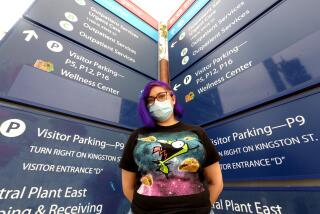A critical need
- Share via
Anew report on healthcare in South Los Angeles, released this week, arrives at a critical moment and serves as an important reminder about the crisis that county supervisors have created for that area. Stripped of the rhetoric that has distorted the debate for a generation, “Critical Condition: Examining the Scope of Medical Services in South Los Angeles” overwhelmingly makes the case that the supervisors, while right to close Martin Luther King Jr.-Harbor Hospital, still have a practical and moral obligation to see that the county’s poorest residents -- many of whom face special health problems -- receive the care they need.
King-Harbor, once known as King-Drew, was an abominable facility whose staff neglected patients and aggravated both health and social crises. That it was born of the 1965 Watts riots and the much-ignored recommendations of the McCone Commission only deepened the tragedy of King-Harbor -- and ensured that it would become embroiled in racial politics.
“Critical Condition,” commissioned by the California Endowment, moves the debate forward, concentrating not on history but on the facts that define today’s problem -- those who need medical care and the kinds of care they need. The scope of that problem is painfully evident from the report’s central conclusions: South Los Angeles today has just 59 emergency-room treatment stations, one-half to one-third of what it requires; it has about 700 inpatient beds in the face of demand for 2,000; and patients in search of specialty care wait six months to a year to get help. There is about one hospital bed per 1,000 residents in South Los Angeles; a few miles away, in areas such as Santa Monica and West Los Angeles, there are more than four beds per 1,000 inhabitants.
Those deficiencies are only the beginning, and they are set against glaring, heartbreaking stresses. To cite just one: Despite a homicide rate among young adults that is three times that of Los Angeles County, South Los Angeles has the lowest per-capita number of emergency stations anywhere in the county.
For decades, the county supervisors have listened to the voices of those who saw King-Harbor as a symbol of racial justice rather than those who begged for a quality hospital. The result was not only a failed hospital but a collapse of care. Today, some worry that the county will attempt to reassert itself in the management of a new hospital built from the wreckage.
To be clear: We do not trust the county to run this hospital, and we will oppose, as anyone should, any recommendation that would involve the county in its future management. But we will insist, and others should as well, that the county find alternative ways to care for a population whose needs are so profound.
More to Read
Sign up for Essential California
The most important California stories and recommendations in your inbox every morning.
You may occasionally receive promotional content from the Los Angeles Times.












